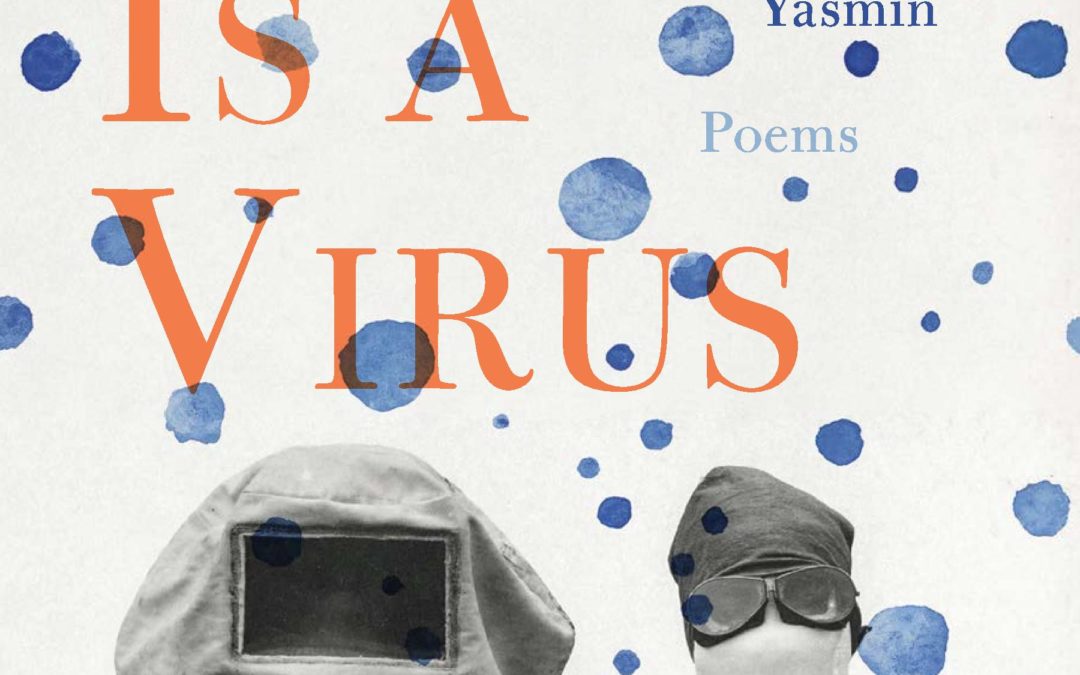Dr. Seema Yasmin’s debut poetry collection, If God Is A Virus , is a beautifully-crafted example of interdisciplinary work, combining medical history, scientific facts, data, and art in the name of poetry. Drawing on first-hand journalistic and medical experiences from West Africa and the United States, Yasmin highlights a number of challenging concepts, from the specific cruelties and hardships suffered from the largest Ebola epidemic in history to the broader perspective of the value of human life.
With such intense, harrowing, and sometimes-controversial topics at hand, this collection is immaculately composed and arranged so as to demonstrate Yasmin’s expert knowledge and enriching personal experience with the concepts and events depicted. Through these poems, she explores themes including the horrors of colonialism and war as well as the impact of racism (overt and subconscious) on media representation, medical care, and empathy. She does not shy away from these things, illustrating them with vivid detail that may turn the stomach, perhaps in an effort to compel readers to understand, sympathize, or contemplate.
From the first poem entitled “Disease Is Not the Only Thing That Spreads,” Yasmin strikes her readers with visceral images and poignant language — disease is deadly, but so, too, is colonialism, for-profit medical models, and ill-informed “phobias.” We are struck with the bluntness of this flagship poem through its use of frequent fragments and decisive periods. This is not a piece designed to evoke longing or nostalgia or anything soft and human; it is instead capable of coaxing fury, lament, fear, disgust. Readers must cope with the harsh imagery (with mentions of “twisting bowels” and “fermenting torment” of note) without respite — by design, presumably, because the subjects of this poem (of the collection) have been forced to endure the same fate. By comparison, the readership experience is mundane, but it disturbs and compels the reader immediately with precise and evocative language, deliberate style, and abrasive descriptions.
The first appearance of a poem sharing the name of the book is stark in its brevity and expert use of white space. There is rage here as well as disappointment; offering pointed commentary on the anti-vaxxer ideology as well as the rampant hypocrisy in such circles (such as refusing to receive vaccinations but dabbling in recreational drugs), this poem presents a strange relationship between autonomy, religion, healthcare, and science. Yes, you may make decisions for yourself. Yes, God has wishes and plans. Yes, both of these things can contradict themselves, and yes, there are other players involved who can change the tide, rewrite fate, make every intention and goal irrelevant. It’s a fascinating piece that is carefully constructed and deserving of thoughtful consideration.
As we progress through the collection, Yasmin dips deeper into the facts and reality, forcing us to recognize yet again the effects of unchecked and unchallenged racism, bias, and bigotry, especially in positions (and fields) of power. She presents a chart which features the results of a 2016 study on biologically implausible beliefs and the percentage of participating medical students and doctors who, nonetheless, believe them. The title of this piece, “What They Hear When They Listen to Your Heart,” coupled with the presented findings, contributes to the realization of something that many people of color already know — the medical field houses racial biases that can actively contribute to a disparity of care or even an increase in harm. White medical students and professionals may not have a truly objective perspective; they are prone to false beliefs as most people are. The problem therein resides within the fact that a doctor holds considerable power over the health and well-being of their patients; with unchecked biases and implausible beliefs, doctors provide and prescribe different care to patients of color, resulting in healthcare inequality that, quite frankly, can kill.
An Emmy Award-winning journalist, disease detective, medical doctor, and author, Dr. Seema Yasmin has done an incredible job with this poetry debut. You can also check out her recent book, Viral BS: Medical Myths and Why We Fall for Them , if you are interested in learning more about the communicable nature of misinformation, particularly in regards to health and medicine. This book aims to debunk false beliefs and educate readers on some medical facts that might not be common knowledge. With a masterful blend of history, data, and empathy conveyed through a playful yet professional voice, Viral BS is a worthwhile read. Plus, Yasmin also made a Buzzfeed quiz regarding medical misinformation, so test your know-how before reading the book.
If God Is A Virus will be available on April 6, and you can pre-order a copy today. You can also connect with Yasmin on Twitter!
An advanced reading copy of If God Is A Virus was given to me by Books Forward through their BFF program for the purpose of an honest review, featured above. You can read the full review on Medium.
